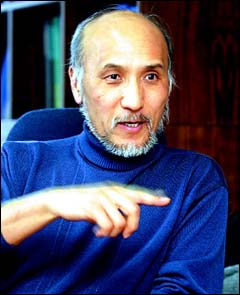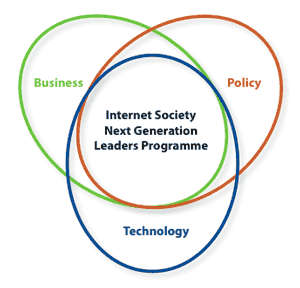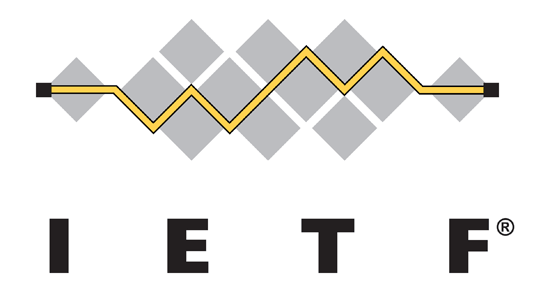29 August 2012 — Five leading global organizations — IEEE, Internet Architecture Board (IAB), Internet Engineering Task Force (IETF), Internet Society and World Wide Web Consortium (W3C) — today announced that they have signed a statement affirming the importance of a jointly developed set of principles establishing a modern paradigm for global, open standards. The shared “OpenStand” principles —based on the effective and efficient standardization processes that have made the Internet and Web the premiere platforms for innovation and borderless commerce—are proven in their ability to foster competition and cooperation, support innovation and interoperability and drive market success.
Continue reading
IETF
Kilnam Chon Receives 2011 Jonathan B. Postel Service Award
 [Taipei, 16 November 2011] — The Internet Society today announced that its prestigious Jonathan B. Postel Service Award was presented to leading technologist Professor Kilnam Chon for his significant contributions in the development and advancement of the Internet in Asia.
[Taipei, 16 November 2011] — The Internet Society today announced that its prestigious Jonathan B. Postel Service Award was presented to leading technologist Professor Kilnam Chon for his significant contributions in the development and advancement of the Internet in Asia.
Professor Chon contributed to the Internet’s growth in Asia through his extensive work in advancing Internet initiatives, research, and development. In addition, his pioneering work inspired many others to promote the Internet’s further growth in the region. The international award committee, comprised of former Jonathan B. Postel award winners, noted that Professor Chon was active in connecting Asia, and that his efforts continue today in the advancement of the Internet in other regions.
Continue reading
e-meeting – Dec 15 – Deployment & Operationalization Hub (DO Hub)
 The Internet Society will hold an e-meeting on 15 December to introduce a new initiative that collects, creates, and promotes detailed deployment information for IPv6, DNSSEC, and other future standards developed by the IETF. The Deployment & Operationalization Hub (DO Hub)* will work with first adopters to collect and create resources that are easy to understand and quickly actionable by the greater operations community, and will actively solicit the larger community for advice on what deployment topics to cover next.
The Internet Society will hold an e-meeting on 15 December to introduce a new initiative that collects, creates, and promotes detailed deployment information for IPv6, DNSSEC, and other future standards developed by the IETF. The Deployment & Operationalization Hub (DO Hub)* will work with first adopters to collect and create resources that are easy to understand and quickly actionable by the greater operations community, and will actively solicit the larger community for advice on what deployment topics to cover next.
Many Chapter members are among the first adopters of new technologies and may be interested in helping provide deployment information via the new DO Hub initiative. In addition, the information DO Hub collects will be valuable to Chapter members actively seeking to deploy new technologies. DO Hub events will also provide an avenue for Chapter members to meet their colleagues in person.
Continue reading
IETF Fellowship (IETF 82 and 83) – Application Deadline is July 15
 The Internet Society has announced that it is inviting applications for its latest Internet Society Fellowships to the IETF, part of its Next Generation Leaders (NGL) programme (www.InternetSociety.org/Leaders). The Fellowship programme allows engineers from developing countries to attend an Internet Engineering Task Force (IETF) meeting.
The Internet Society has announced that it is inviting applications for its latest Internet Society Fellowships to the IETF, part of its Next Generation Leaders (NGL) programme (www.InternetSociety.org/Leaders). The Fellowship programme allows engineers from developing countries to attend an Internet Engineering Task Force (IETF) meeting.
The IETF is the Internet’s premier standards-making body, responsible for the development of protocols used in IP-based networks. IETF participants represent an international community of network designers, operators, vendors, and researchers involved in the technical operation of the Internet and the continuing evolution of Internet architecture.
Fellowships will be awarded through a competitive application process. The Internet Society is currently accepting fellowship applications for the next two IETF meetings:
* IETF 82, 13 – 18 Nov 2011, Taipei, TW
* IETF 83, 25 – 30 March, Paris, FR
Info: http://www.isoc.org/educpillar/fellowship/index.php
Fellowship applications for both IETF meetings are due by 15 July 2011.
We encourage you to pass on information about this program to individuals involved in your network that have a keen interest in the Internet standardisation activities of the IETF.
Continue reading
IETF Outcomes wiki
 The IETF Outcomes wiki is now available on the IETF Tools site.
The IETF Outcomes wiki is now available on the IETF Tools site.
http://trac.tools.ietf.org/misc/outcomes
This wiki lists technologies and services that were developed in the IETF and represent notable successes and failures. The wiki is a collaborative effort of IETF participants, and you are invited to provide feedback to the community about the utility of IETF efforts as well as to facilitate public understanding of IETF work and its impact.
The Seven Stages of IPv6 Adoption
 As part of the IETF 74 meeting in San Francisco, on 24 March the Internet Society organized a panel of experts from industry and other thought leaders on the to discuss the pressing need to adopt Internet Protocol version 6 (IPv6) to ensure the continued growth of the Internet as a platform for innovation.
As part of the IETF 74 meeting in San Francisco, on 24 March the Internet Society organized a panel of experts from industry and other thought leaders on the to discuss the pressing need to adopt Internet Protocol version 6 (IPv6) to ensure the continued growth of the Internet as a platform for innovation.
IPv6 is the next generation Internet Protocol (IP) standard intended to supplement, and eventually replace, the IPv4 protocol most Internet services use today. To help ensure the continued rapid growth of the Internet as a platform for innovation, IPv6 tackles some of IPv4’s shortcomings – most notably a limited amount of remaining addresses. While the technical foundations of IPv6 are well established, significant work remains to deploy and begin using IPv6 capabilities.
Because IPv6 is central to the continued growth and stability of the Internet, the Internet Society is working with its members and other organizations to promote its deployment by sharing information and helping to build the required operational capability among the Internet community.
More information, including panelist bios and slides: http://www.isoc.org/isoc/conferences/ipv6panel/
Continue reading
IETF Fellowship application deadline extended to Jan 5 2009
 The Internet Society is seeking applications for the next round of the ISOC Fellowship to the IETF program. The program offers engineers from developing countries fellowships that fund the cost of attending an Internet Engineering Task Force (IETF) meeting.
The Internet Society is seeking applications for the next round of the ISOC Fellowship to the IETF program. The program offers engineers from developing countries fellowships that fund the cost of attending an Internet Engineering Task Force (IETF) meeting.
The IETF is the Internet’s premier standards-making body, responsible for the development of protocols used in IP-based networks. IETF participants represent an international community of network designers, operators, vendors, and researchers involved in the technical operation of the Internet and the continuing evolution of Internet architecture.
A Rough Guide to ISOC’s IETF73 Hot Topics
 ISOC’s Standards & Technology department offers the following “rough guide” to hot topics being discussed at the 73rd IETF meeting in Minneapolis
ISOC’s Standards & Technology department offers the following “rough guide” to hot topics being discussed at the 73rd IETF meeting in Minneapolis
(November 16-21, 2008). This simply indicates which meeting sessions are
particularly focused on the following topics:
- Bandwidth Management
- IPv4/IPv6 Coexistence
- DNSSEC
- Trust and Identity
Remote participation in all meetings will be possible — see specific
meetings listed on http://tools.ietf.org/agenda/73/ for access to audio stream and jabber rooms. That page also includes links to helpful tarballs of documents being discussed at meetings, etc.
For the full IETF meeting plan and agenda, see http://www.ietf.org/meetings/73/
Continue reading
CFP: IETF workshop on P2P Infrastructure – MIT – May 28
 The Real-time Applications & Infrastructure (RAI) Area of the Internet Engineering Task Force (IETF) will hold a workshop on P2P Infrastructure on May 28, 2008 at 50 Vassar St, Room 34-101 on the MIT campus in Cambridge, MA USA. They are calling for papers to be submitted before May 9. Continue reading
The Real-time Applications & Infrastructure (RAI) Area of the Internet Engineering Task Force (IETF) will hold a workshop on P2P Infrastructure on May 28, 2008 at 50 Vassar St, Room 34-101 on the MIT campus in Cambridge, MA USA. They are calling for papers to be submitted before May 9. Continue reading
IETF scholarships offered to ISOC Chapters
 The IETF (Internet Engineering Task Force) will hold IETF 71 in Philadelphia on March 9 – 14 2008.
The IETF (Internet Engineering Task Force) will hold IETF 71 in Philadelphia on March 9 – 14 2008.
The IETF has offered to waive the registration fee for a limited number of ISOC chapter members who otherwise could not attend. One such scholarship is available per chapter.
ISOC-NY is looking for a suitable candidate who could attend on our behalf. Please note that the meeting lasts 6 days and the attendee would have to cover his/her own costs of transport and accommodation. If desired, IETF will provide a mentor who can introduce him/her to the meeting process.
The schedule for IETF 71 can be found at www.ietf.org. Continue reading
Flow Rate Fairness: Dismantling a Religion
Network engineer Richard Bennett’s new article for The Register: Dismantling a Religion: The EFF’s Faith-Based Internet explores the difference between the way the EFF wants to see the the Internet managed and current discussions under way in the IETF.
Bottom line: the Internet has never had a user-based fairness system, and it needs one. All networks need one. Continue reading
Nii Quaynor receives 2007 Postel Award
 Reston, VA and Geneva, Switzerland – 5 December 2007 – The Internet Society has awarded pioneering Internet engineer Nii Quaynor the prestigious Jonathan B. Postel Service Award for 2007 for his leadership in advancing Internet technology in Africa and galvanizing technologists to improve Internet access and capabilities throughout the continent. Continue reading
Reston, VA and Geneva, Switzerland – 5 December 2007 – The Internet Society has awarded pioneering Internet engineer Nii Quaynor the prestigious Jonathan B. Postel Service Award for 2007 for his leadership in advancing Internet technology in Africa and galvanizing technologists to improve Internet access and capabilities throughout the continent. Continue reading
IETF revises IDN implementation proposals
Revised papers of the technical standards that define the implementation of IDNs — the standards are called IDNA — were recently released via the IETF editors. These revisions are an important step toward the delegation of IDN top-level domains. Continue reading
